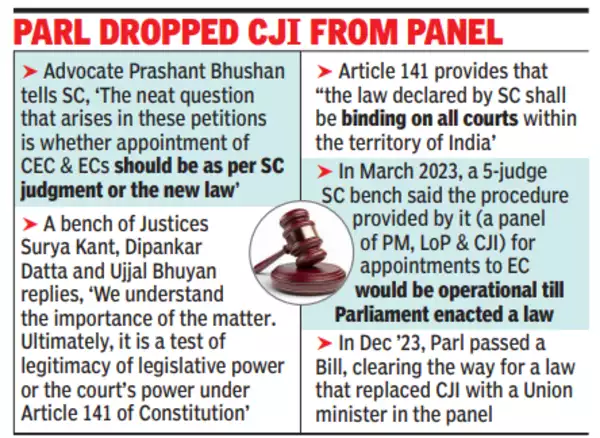NEW DELHI: Supreme Court on Wednesday said examining the validity of the 2023 law, which altered the SC-prescribed composition of the panel for selection of chief election commissioner (CEC) and ECs, would boil down to a contest between Parliament’s power to legislate on the selection framework and SC’s power as a constitutional court.
On Marc 2, 2023, a five-judge SC bench in Anoop Baranwal case had noticed a vacuum in parliamentary legislation on the process for appointments to Election Commission and directed that a panel comprising the PM, leader of opposition (LoP) and Chief Justice of India would advise the President on this. SC had said its prescription would hold good until the Centre came up with a law to lay down a mechanism, for the first time ever, for the selection.
Enabled by the leeway so provided and citing Article 324 of the Constitution that left it for Parliament to frame a law for the purpose, Parliament in Dec 2023 passed a Bill, clearing the way for a law which had a Union minister, in place of the CJI as suggested by the top court, as a member of the panel alongside the PM and LoP.

Many petitions were immediately filed before the court claiming that the law violated the spirit of its judgment, which was to maintain the independence of EC. On Jan 12, 2024, a bench of Justices Sanjiv Khanna (now CJI) and Dipankar Datta refused to stay operation of the law.
On Wednesday, advocate Prashant Bhushan said the incumbent CEC was scheduled to retire in Feb, and SC should hear the petitions urgently. The court listed the matter for hearing on Feb 4.
The court framed the issue as centered on which of the two mechanisms would take precedence, Supreme Court’s outlined in the Baranwal case or the law enacted by Parliament.
Bhushan concurred and said, “The neat question which arises in these petitions is – whether the appointment of CEC and ECs should be as per the SC judgment or the new law.”
A bench of Justices Surya Kant, Dipankar Datta and Ujjal Bhuyan said, “We understand the importance of the matter. Ultimately, it is a test of legitimacy of legislative power or the court’s power under Article 141 of the Constitution.”
EC appts process valid till Parliament enacts law: SC in 2023
Article 141 provides that “the law declared by the Supreme Court shall be binding on all courts within the territory of India”. Interestingly, the five-judge SC bench in its March 2023 judgment had said that the procedure provided by it for appointments to EC would remain operational till Parliament enacted a law on the issue.
Advocate Prashant Bhushan said the SC judgment on composition of the selection panel had seminal importance in infusing independence in the EC. Substituting the CJI with a Union cabinet minister, chosen by the PM, would make the panel a government body and any selection of ECs by it would be seen as interfering with the independence of EC.
He said the EC’s independence was vital to the legitimacy of elections and the vibrancy of democracy. The bench asked him to remind the court on Feb 3 to list the batch of petitions for hearing on Feb 4.
On March 4 last year, EC Arun Goel had resigned after a challenge to his appointment was dismissed by the SC in Aug 2023. As another EC Satish Chandra Pandey had retired in Feb 2024, the EC was reduced to a one-member body in CEC Rajiv Kumar.
In the meantime, a panel comprising the PM, home minister Amit Shah and then LoP Adhir Ranjan Chowdhury (who dissented) recommended appointment of IAS officers Gyanesh Kumar and Sukhbir Singh Sandhu as ECs on Mar 16 last year ahead of Lok Sabha elections.
